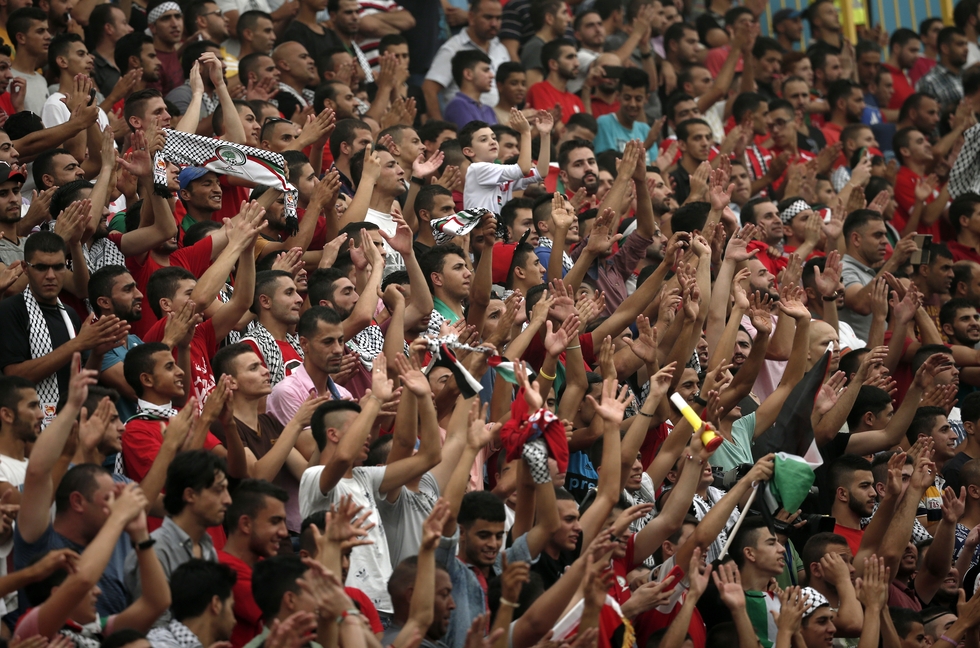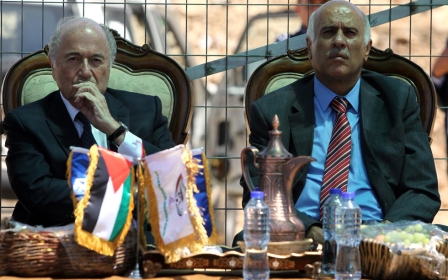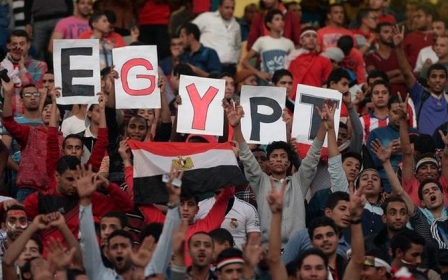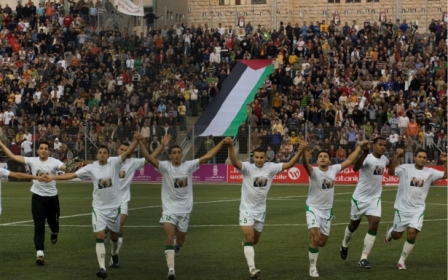Saudi team refuses to play qualifying match in the West Bank

Tensions boiled between the Palestine and Saudi football federations over the latter’s refusal to play the second leg of a qualifying match for the 2018 World Cup and 2019 Asian Cup in the occupied West Bank, citing security reasons.
Adnan al-Mubeid, the official spokesperson of the Saudi Football Federation, sent a letter to his counterpart in the Asian Football Confederation, apologising for the Saudi’s team withdrawal.
“The [Saudi] football federation has officially announced the withdrawal of the Saudi team from the match against the Palestine team,” the letter read, “that was supposed to take place on Thursday 5 November at the Faisal al-Husseini stadium in Ramallah in the fifth round of Group A’s double qualifiers.”
The other teams in Group A are East Timor, Malaysia and the UAE.
The first leg of Palestine versus Saudi Arabia was originally set to take place in Ramallah, with the Palestine team hosting the Saudi one. But the two federations agreed to swap the fixtures, and on 11 June, Palestine played Saudi Arabia in Jeddah, losing 3-2.
After agreeing to the fixture swap, Tayseer Nasrallah, the spokesperson for the Palestine Football Federation (PFF), said: “We emphasised to the Saudi brothers the high importance of their support for the Palestinian team hosting its home games in Palestine.”
The Saudi team’s decision not to play in Ramallah strained relations with the head of the Palestine Football Federation, Jibril Rajoub, who categorically rejected Saudi’s request to play the match outside the West Bank in a neutral zone. To Rajoub, this option represented a threat to the “sovereignty” of the Palestine Football Federation.
“We need to point out to all those who fear normalisation with Israel that no such fear should arise as long as the goal is to play against the team of Palestine on the land of Palestine,” he stated.
Fear of normalisation
However, Saudi observers have accused Rajoub of forcing Israel’s policies on the Saudi team, who in order to cross into the West Bank via the Allenby crossing will require Israeli entry visas stamped inside their passports, in addition to crossing several Israeli checkpoints.
In a written response, the PFF proposed an alternative to stamping the Saudi team’s passports with Israeli visas, in the presence of a representative from FIFA. The statement also suggested increased coordination with the Jordanian authorities to facilitate the entry and exit of the Saudi team, who are currently first place in the qualifying group.
For Saudi Arabia, the idea of participating in what they consider as a blatant show of normalising acts with Israel is a reason for concern, with regards to how engaging with an enemy state will reflect in the Arab and international arenas, due to breaking its own political status quo with Israel.
Rajoub has previously made it clear that the PPF will challenge any attempts for away games refusing to play in the occupied territories, and that if the international footballing federation did not side with the PFF, the outcome would only signal the end of Palestinian sports movement.
“It is our legitimate historical right to host historic home games on our land, and we are not going to give it up,” he said.
However, with Saudi’s final decision to not play in Ramallah, Rajoub threatened to involve the Saudi King Salman bin Abdelaziz to “ensure the match is played in Palestine”.
Saudi support for their team, derisiveness at Rajoub
The Saudi team’s decision to not play in Ramallah has elicited an onslaught of social media reactions, with many Saudis praising their team as the true victors for their stance and reaffirming their support for the Palestinian cause by not engaging in normalisation.
A sports show on the Saudi-owned MBC “Action-ha” channel poked fun at Rajoub’s indecisiveness, where he allegedly agreed to host the match in a neutral zone on the condition that the rest of the countries in the group agreed to do the same. The show then played a short clip of Rajoub’s public statements and appearances, sometimes juxtaposed with images of himself that contradicted his words.
Unconfirmed reports said that the match will be moved to Jordan, after a telephone call took place between Palestinian Authority President Mahmoud Abbas and the Saudi Deputy Crown Prince Mohammed bin Salman.
On Wednesday, FIFA ruled out the PFF's plan to host the 2018 World Cup matches on its home ground, saying that the PFF could not guarantee the safety and security of the matches.
The games would be played in a neutral area.
FIFA said the decision was taken after the "Palestinian government confirmed that it could no longer guarantee the safety and security around the matches in question".
For its part, the UAE expressed none of the concerns voiced by Saudi Arabia and travelled to Ramallah to play in the first leg against the Palestine team at the beginning of September. The match was attended by over 12,000 football fans, but neither team could break the deadlock and the game ended in a 0-0 draw.
According to Tunisian website Jomhoriya, the UAE footballing federation believes that hosting the Palestine versus Saudi match in a neutral area is detrimental to the principle of equal opportunities.
New MEE newsletter: Jerusalem Dispatch
Sign up to get the latest insights and analysis on Israel-Palestine, alongside Turkey Unpacked and other MEE newsletters
Middle East Eye delivers independent and unrivalled coverage and analysis of the Middle East, North Africa and beyond. To learn more about republishing this content and the associated fees, please fill out this form. More about MEE can be found here.




